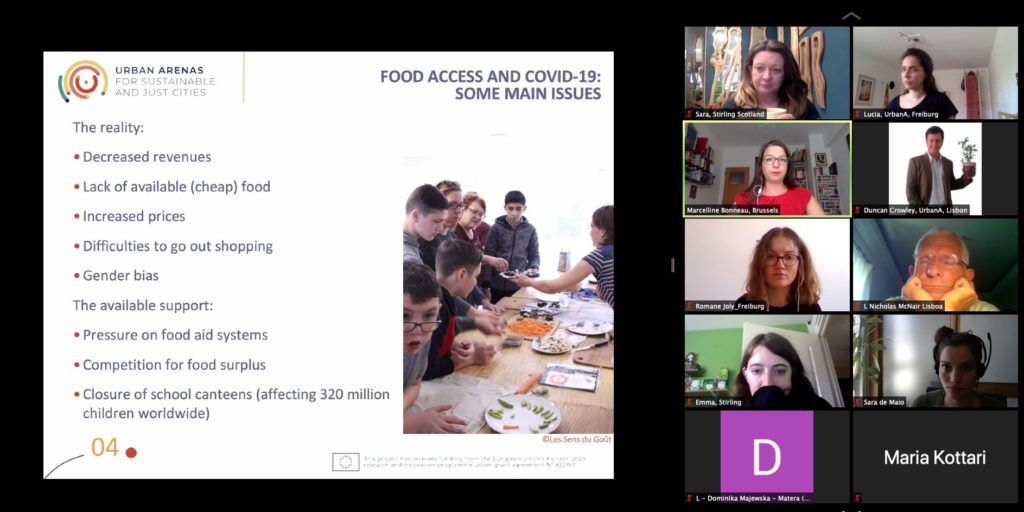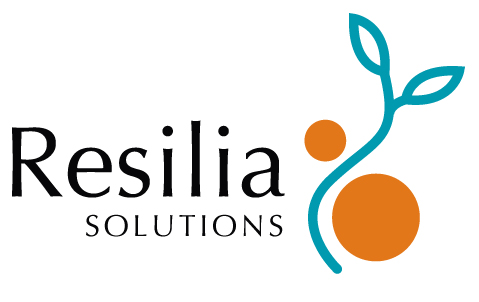
People of varied backgrounds and from all over the world met at the UrbanA Community Conversation on 30th June 2020 to address the question of food poverty and solidarity. UrbanA Fellow Marcelline Bonneau, an expert in both the URBACT programme and the Urban Innovation Actions initiative, led the conversation. She began by sharing her experience and understanding of how European municipalities have approached food poverty during the COVID19 crisis. She focused on three questions:
- How have cities supported those in need of food during the crisis?
- How have cities reorganized traditional food aid systems, such as funded meals in canteens or regular food distributions?
- How can food more widely address (urban) poverty?
As the situation of the most precarious has deteriorated during the crisis, with traditional food solidarity systems being disrupted, there has been a boom in solidarity initiatives, both by citizens — Solidarity Baskets in Italy, #poureux in France and Belgium — and municipalities. Examples include the municipality of Atheniou, Cyprus supporting bottom-up networks of volunteers; Mollet de Vallès, Spain, compensating for the loss of school canteen meals; Milan, Italy readjusting its food aid systems; and Mouans-Sartoux, France embedding solidarity in its food sovereignty project.
“More than ever, food solidarity should be part of wider local food policies, ensuring the closest and most direct link between people and their food, collaborating in addressing this issue in an equal way, seeking to reduce power imbalances between those supporting and those supported,” said Marcelline.
She then briefly sketched the ways food can help address urban poverty, based on the case of TAST’in FIVES in Lille, France.
All the cases from URBACT cities can be found in the presentation slides and this URBACT article. More information about the ways to address urban poverty via food will be shared on the UIA TAST’in FIVES project website after the summer. See also Marcelline’s presentation on Youtube here.
Challenging issues
After her presentation there was a rich discussion among participants, with varied perspectives, embedding the debate within wider understandings of community support, food solidarity, urban gardening projects and, ultimately, food sovereignty. Some of the most challenging issues raised related to links between sustainability and justice (sustainable food and deprived populations); administrations and citizens (where to best meet); private and public sectors (including the risk of greenwashing); mainstream economic models and degrowth; and between urban/community gardens and those in need (currently piloted in Nantes as nourishing landscapes).
Participants shared a wealth of other cases and experiences:
- Sara Stirling who collected 22 tons of food surplus from supermarkets in the covid-19 crisis for a community kitchen;
- The challenge of organising bottom-up initiatives in China, where they focus on small range actions among friends only;
- The need to learn from the crisis to prevent other zoonoses , for example by increasing availability of plant-based diets;
- A food resilience hackathon taking place in France;
- A French community project to create a territorial food resilience platform, CRISALIM, which aims to make accessible, via repurposing of existing resources, a directory of field information and concrete tools on food resilience to apply in specific territories;
- In France again, Strasbourg, Lyon, Marseille, Bordeaux and Paris’ districts following the example of Grenoble in focusing on food resilience; and
- The high visibility of the solidarity initiative “Milano Aiuta” thanks to influencer Chiara Ferragni.
Further relevant information is available on the UrbanA wiki pages Sustainable food supply chains, Social food movements and Community gardens and food.
What else should cities be doing to address food poverty?
Participants stressed that cities should learn from this period to increasingly map people suffering from food poverty, along with relevant support organisations. They should also focus more on the local scale as well as larger scale initiatives for urban gardening: managed by all, available to all. And as Consuelo Giansante said: “Community gardens for vulnerable groups are not only thought of in terms of vulnerable groups working in them, they can also partially shift municipal food aid from large distribution chains to local producers.”
Marcelline concluded: “I would like to thank very much UrbanA for this opportunity and look forward to further collaboration in the project as a Fellow!”
Want to get in touch with the UrbanA Community? Check out our upcoming eventsand join our dedicated chat on the Communities for Future platform or simply send an email to spaeth ‘at’ envgov.uni-freiburg.de. You can also subscribe to our newsletter and follow us on Twitter, Instagram, LinkedIn and Youtube.
Some additional resources on food poverty
Statements
- COVID-19 and the crisis in food systems: Symptoms, causes, and potential solutions (IPES-Food, April 2020)
- Urban food systems and COVID-19:The role of cities and local governments in responding to the emergency
Articles
- Covid-19: a springboard for more food solidarity?
- Social Innovation and Food Provisioning during Covid-19: The Case of Urban–Rural Initiatives in the Province of Naples
- Food charity: Solidarity, vulnerability and the impact of COVID-19
- La crise du Covid-19 met en lumière la nécessaire remise en cause de l’aide alimentaire
Videos
- Milan Pact Talk — Covid19 Food Aid Systems — Sao Paulo, Milan, Barcelona, Washington DC
- June 2020 Food Thinkers: Claire Thompson
Reposted from the UrbanA blog
